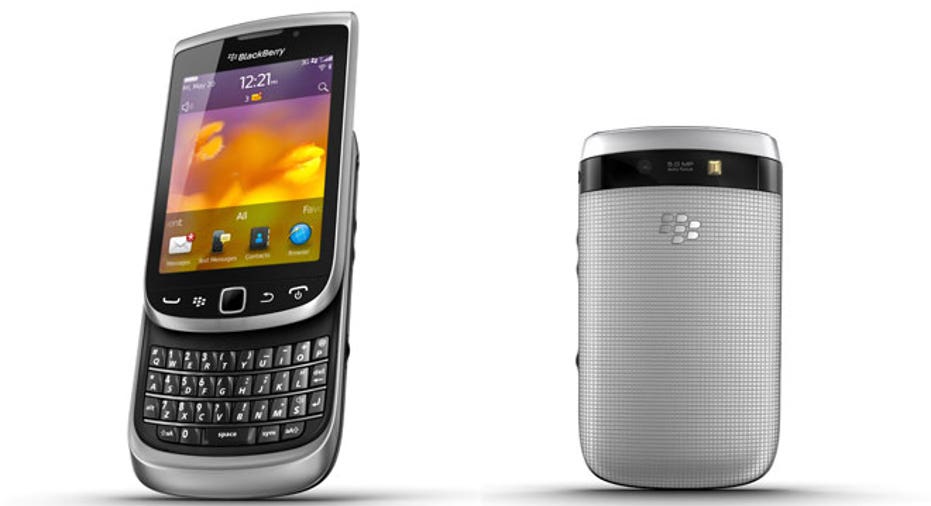RIM Launches Two New Blackberry Torch Phones

TORONTO – Research In Motion went on the offensive Wednesday, unveiling two new and powerful versions of its touchscreen BlackBerry Torch, including an all-touch model, as it seeks to regain ground lost to Apple and Google.
The new phones, along with an upgrade to its Bold model shown earlier, are part of what the Canadian company called the biggest global launch in its history as it seeks to claw back North American market share from Apple's iPhone and a slew of devices running on Google's Android software.
The refreshed lineup is designed to buy RIM time until it introduces a radically new software package for its smartphones next year.
Investors reacted favorably, pushing RIM's deflated stock price up 5 percent by midday.
"RIM's new BlackBerry smartphones could well be the most important devices in the Canadian smart device vendor's history, following a recent slowdown in device shipments, staff cuts and doubts over the company's strategy and leadership," Ovum analyst Tony Cripps said.
RIM is slashing 2,000 jobs from its global workforce to reduce costs and streamline operations after posting a fall in profit and a dismal earnings outlook in its last quarterly report.
The three touchscreen phones, running on the new BlackBerry OS 7, boast improved screen displays and pack a 1.2 GHz processor from Qualcomm, the most powerful ever for a BlackBerry phone. They also have a dedicated graphics processor that should make video and gaming sharper and more responsive.
The browser is 40 percent faster than the original Torch, RIM's last major phone launch, which hit shelves almost a year ago.
All three devices will be launched by carriers around the world by the end of August, RIM said. The slider Torch will be exclusive to AT&T in the United States, the carrier said.
The all-touch Torch is RIM's first attempt at the popular style since two versions of its Storm model failed to excite.
"It's definitely an acknowledgement that there are people that want that full-touch device," RIM's newly promoted global head of sales, Patrick Spence, said in a phone interview.
LOOKING AHEAD
The timing could boost RIM's earnings for the quarter ending in late August as it sells the phones to carriers, but evidence of uptake among users won't be available until the following quarter.
Since Co-Chief Executive Mike Lazaridis has already promised "superphones" next year using the QNX-based operating system that runs RIM's PlayBook tablet computer, analysts are looking beyond this launch.
"This is a necessary product refresh in advance of the big bang that we hope and expect will happen with QNX-based phones," said John Jackson, vice-president of research at CCS Insight.
RIM shipped 13.2 million phones in the three months to late May, its first fall in shipments from a previous quarter since at least mid-2007, as it pushed this launch back to August.
RIM's aging hardware and software have looked increasing outdated as manufacturers such as Motorola, Samsung and HTC push out sleek, large-touchscreen devices using Android and its extensive offering of applications.
The slider Torch looks identical to the original touchscreen device with a slideout Qwerty keyboard, but it packs more powerful insides.
The Bold upgrade includes a near-field communications (NFC) chip to turn the phone into a mobile wallet. It was first shown at RIM's BlackBerry World conference in May.
RIM's North American market share has fallen in the past year as high-end Android devices proliferate and U.S. carrier Verizon added Apple's iPhone to its lineup. Globally the fall has been less severe, but from a smaller starting point, according to data compiled by research firms CCS Insight and Gartner.
U.S sales accounted for less than 27 percent of RIM's revenue in the most recent quarter, down from 50 percent a year earlier, as international markets picked up some of the slack.
"What would constitute success for these guys is essentially holding the fort," CCS's Jackson said. "A stop-loss outcome would be a success for these products in developed markets."
Shares of Waterloo, Ontario-based RIM have dropped 65 percent from their peak in February as the company's earnings and outlook missed expectations and its PlayBook failed to dent the iPad's dominance of the tablet market.
The stock was up more than a dollar at $25.37 on the Nasdaq and at C$24.47 on the Toronto Stock Exchange at midday Wednesday. It closed on Tuesday at its lowest level in five years, giving the company a market capitalization of $12.7 billion.
($1=$0.96 Canadian) (Editing by Janet Guttsman and Peter Galloway)



















